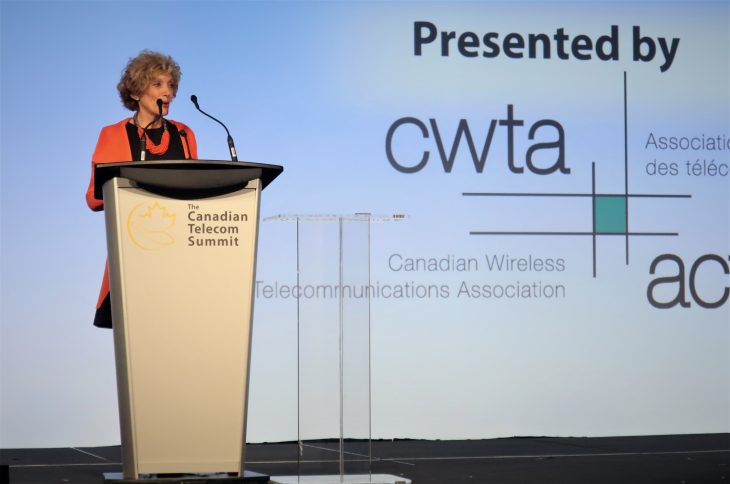
TORONTO – Janet Yale, chair of the Broadcast and Telecom Legislative Review panel, told the telecom industry on Monday morning that they will have to think far more broadly than their quarterly numbers and short term business plans when her panel makes their final recommendations to the federal government in January.
In a keynote speech at the start of the Canadian Telecom Summit on Monday, Yale said she had initially hoped to bring copies of the panel’s interim report for delegates, but it’s not quite ready for release, so instead she focused her remarks on reminding the telecom folks in attendance that she and her panel members are focused on some very big pictures.
Final recommendations coming in eight months are to “provide the tools, resources and authorities to policy makers and regulators to enable them to address both the promise created and disruption brought about by technological change,” she said.
However, we won’t see any recommendations at all in the interim report coming out later this month. It is instead to be a summary of what the panel heard during its months-long, cross-country consultations where they met with 150 individuals and groups in 11 communities, as well as over 2,000 written submissions filed in January, which Cartt.ca dissected throughout that month.
(Update: Yale told delegates after her speech that all of those submissions will be made public on the BTLR panel web site when the "What We Heard" report is released.)
The task facing the panel is huge as it has to grapple with setting a renewed legal framework which will flexibly backstop the rollout of new technology like 5G (and all the other Gs sure to follow), ensure all Canadians have equitable access to all that new tech and connectivity no matter where they live and what they can afford, make sure the conditions exist so that lots of good Canadian content is made and discoverable, not to mention protecting the choices, power and privacy of Canadian citizens.
Oh, and they have to reset the institutional framework too – what the CRTC does, what ISED and the Competition Bureau might be responsible for, even the mandate of the CBC – and while they’re at it, the panel also has to try and preserve real local news in an era of social media troll-driven fake news.
No pressure.
So while there won’t be any hint at what the seven-person panel is thinking in the What We Heard report, Yale explained that after hearing from so many Canadians she has reached some conclusions. “We must think big. We must think globally. We must think, not about what will serve Canada and Canadians well for the next few years, but for the next full generation, at least… We need to build our legislative framework, even in the face of dizzying change – perhaps because of that dizzying change – to persevere until 2040 or even 2050.”
That’s not something business leaders do very often. It’s hard to see past the next year, or even the next quarter, but that is the panel’s task and Yale hopes the industry respects that. “People in our industry don’t have the luxury of thinking in those terms often. We have shareholders and bosses. Markets and customers. Consumers and clients. It tugs us understandably toward the immediate. But on these matters, we get the chance – indeed, we have the obligation – to think more broadly,” she added.
“On the principal and intimidating questions of Canada’s role in the digital economy of tomorrow – and the exercise within that context of our cultural sovereignty, we must grapple with huge issues. We must think long-term if we are to faithfully and responsibly serve the near-term.
So, when the full report is released in January, “I would urge you all to look at the recommendations we offer through that wider lens. At that time, your voices will carry enormous weight with government decision makers. I know you have all engaged forcefully in our consultations. I hope that you will engage forcefully again at that time in response to our recommendations.
“And I hope you will take advantage of the chance to speak out – not just against that which might contradict your current course. But in support of that which might open up whole new avenues of opportunity – brand new lines of business and exciting new possibilities.”


